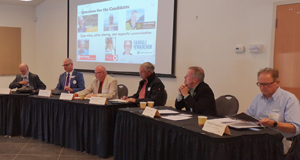
Monday, September 30, 2019 ~ OTTER POINT [Updated October 1]
by Mary P Brooke ~ West Shore Voice News
At the All Candidates meeting for federal Esquimalt-Saanich-Sooke candidates on Sunday September 29 as organized by the Otter Point, Shirley and Jordan River Resident and Ratepayers Association (OPSRRA), an odd occurrence still saw six candidates in the question period, but not the expected set.
OPSRRA-organized debates are anticipated for being well organized, suitably formatted, and attracting an audience that is well informed on the local, regional and broader issues. And yesterday’s event which attracted about 100 people did not disappoint in that regard.
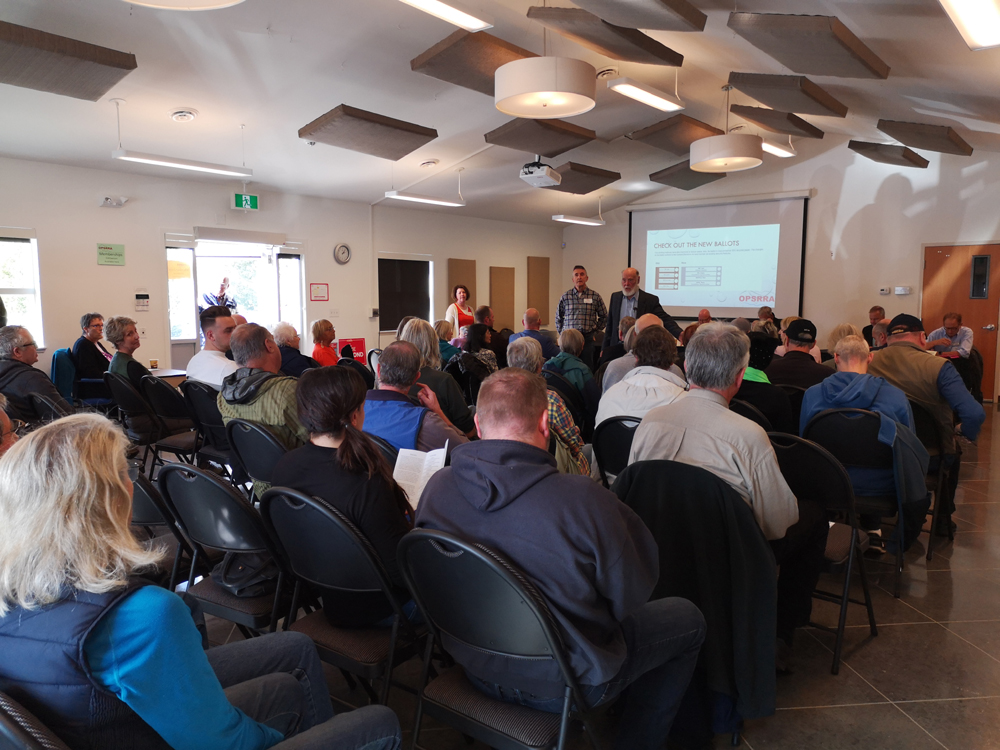
However, just as things were getting rolling for the 2 pm start, independent candidate Dr Philip Ney (who had not been invited to participate) conducted a lengthy rant from the front of the room. It was emotionally disruptive for some, and certainly threw off the tight timeline available for the audience to hear from the major party candidates.
Organizers handled Ney’s escorted exit respectfully, though that eventually required the support of a Sooke RCMP officer who arrived quite promptly considering the remote meeting location at 7450 Butler Road in the Sooke Business Park well west of Sooke.
The candidate for the People’s Party of Canada (Jeremy Gustafson) told the room he was disappointed to not be at the front table with the other candidates for the main portion of the meeting, but that he works with what he has. And as it turns out, Communist Party candidate Tyson Strandlund did not attend at all (though his introduction was read aloud by the lead organizer).
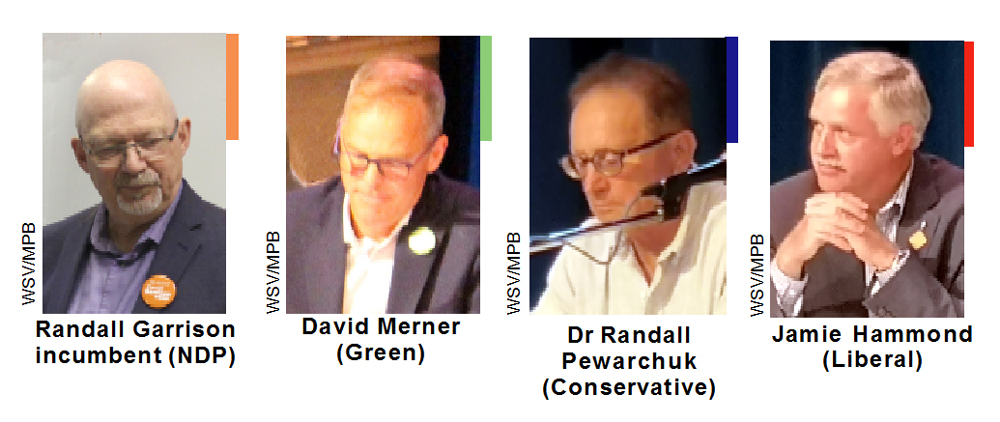
Ultimately, after the four major party candidates — Jamie Hammond (Liberal), Randall Pewarchuk (Conservative), Randall Garrison (NDP), and David Merner (Green) — gave their responses to prepared questions, both Gustafson (PPC) and Ney joined the table for the 30-minute audience question period.
With the support of the group’s executive who began planning the meeting back in July, OPSRRA president Bill Dushenko led the meeting and jockeyed the candidates through their paces.
The three questions prepared in advance for the Liberal, Conservative, NDP and Green candidates covered these key topics: the climate crisis and tools for addressing it; why no federal infrastructure spending on high-speed Internet and clean water spent yet west of Sooke; and the protection of fish stocks and local orca populations.
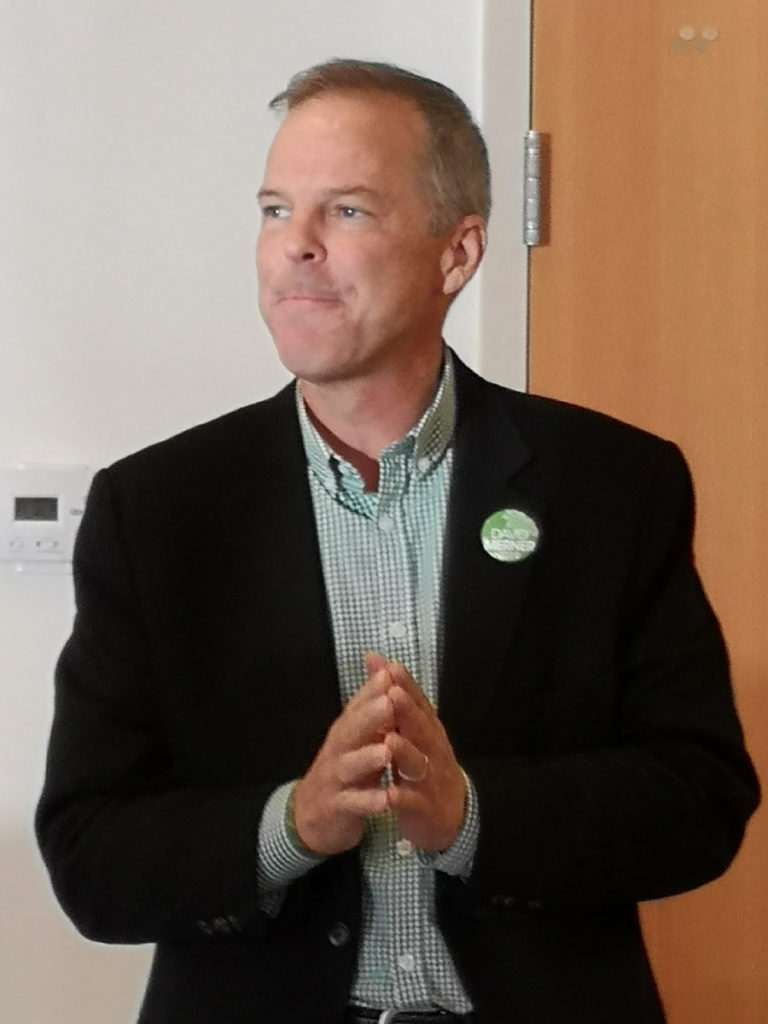
CLIMATE CRISIS. Merner (Green) says the Greens’ 20-point plan is called ‘mission possible’ and says Canada needs a 60% reduction of current greenhouse gas (GHG) emission targets achieved by 2030 to avoid “irrevocable global heating”, as well as carbon neutrality by 2050. The Green position is that all new passenger vehicles should be electric by 2030. The Greens call for a national fracking ban, as has been done in other provinces and countries. The Greens have been campaigning since their inception for environmental action. “Let’s work in an urgent way. This is a crisis. We must act in a dramatic, serious, transformational way.” Garrison (NDP) says economic justice and social justice go hand in hand with climate justice and the work to achieve that will bring people together. “If they leave people behind, they will oppose the changes and goals.” The NDP say they would spent $15 billion on 300,000 renewable energy jobs in the renewable energy industries. Garrison tied in paying attention to rural transportation needs where it’s more difficult for people to make transitions (he notes that the $30 million promised by the NDP for supporting rural ferry service in BC) and overall getting people to support the required transportation needs toward reducing GHG emissions. Pewarchuk (Conservative) says the Conservatives “believe in technology not taxation”. He said: “We will create more jobs in Canada with technological growth while at the same time lowering global emissions — domestic, industrial and global pollution. If we don’t do it this way, we will have an economic catastrophe before we have an environmental catastrophe.” He said a Conservative government would support Canadian industries and reduce GHG’s through technology and selling it to the world; companies would be taxed 5% less for putting money into technology innovation, and be part of reducing the world carbon footprint. Hammond (Liberal) said real action is needed, insisting that the Liberals are the only party that can actually get the required changes done and that “everyone needs to be along on the journey”. He said that under Trudeau during 2015-2019 that “Canada has been leading the way” and “needs to keep moving”. He noted that in Alberta 49% of electricity production is still from burning coal, as just one example of things that need to change. The Liberals said pre-election they would bring in a ban on single-use plastics by 2021.
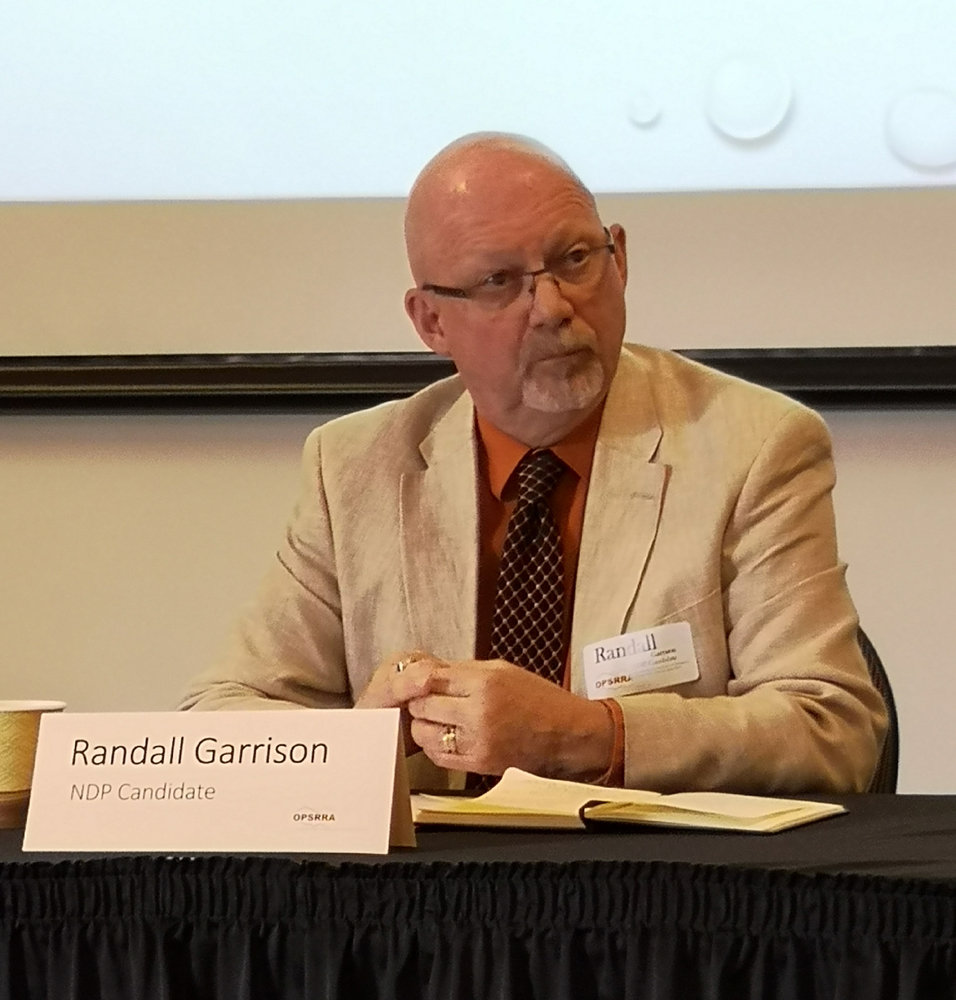
HIGH-SPEED INTERNET to RURAL AREAS. Garrison (NDP): Garrison said the CRTC has taken a narrow approach in just dealing with the ‘wholesale’ side of providing Internet service, awaiting and hoping for industry to do what is required. However, the NDP see the need for more equity of service across Canada and with the provision of emergency services via wireless. As it’s not profitable for big service providers to fully cover the rural areas, Garrison says the NDP sees room for community-owned communications providers, but that regulations need to be changed to accommodate that. Meanwhile, the network of Canada Post infrastructure across the country — especially in rural areas — could enable wireless service in remote areas. Merner (Green): The government should enable people to work from home, which relies on high-speed Internet “to connect to the Internet and the global economy”. He suggests use of the existing infrastructure of post offices throughout rural Canada to be hubs for providing Internet services in the meantime while big industry doesn’t see a profit motive for going deep into sparsely populated areas to service ‘the final mile’. Hammond (Liberal): “By the end of 2020 there will be (adequate/better) service here,” said Hammond, who has worked as an Assistant Deputy Minister in a technology department in the BC government. The role of MP brings people together to make things like this happen, he said. A former military operative, Hammond said: “We had better cell phone coverage in Afghanistan” compared to rural service in some areas of Canada. Pewarchuk (Conservative): “It will take a joint effort to solve,” said Pewarchuk, noting that in the west-of-Sooke region cell towers owned by the larger companies were ultimately shared with smaller service providers (like FIDO). He said the Conservative government was the “only government” who has given attention to rural areas, and a Conservative government would appoint a minister of rural affairs.
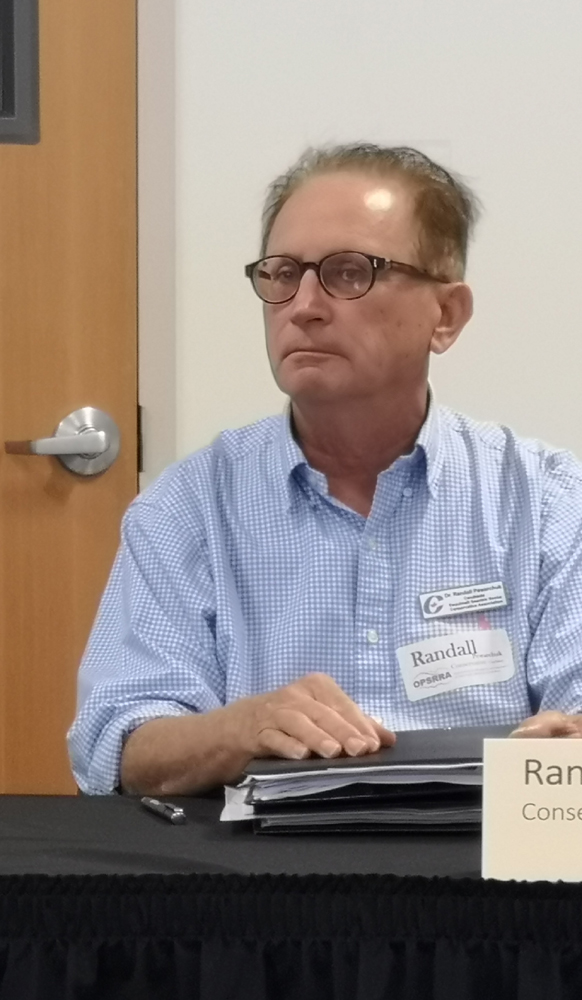
PROTECTION OF FISH & ORCAS. Pewarchuk (Conservative): This year’s Chinook fishing restrictions by the Liberal federal government have not been the answer, said Pewarchuk. He says the local anglers (fishermen) are the ones who know the solutions, one of those being tagging 90% (25 million) of the salmon fry that are let out into the waterways, as a way to restrict over-fishing. That’s an example of thinking outside the box, he said. Federal dollars are needed for executing these strategies, he said. He spoke with urgency, ending his remarks on this question with “people need fish and fish need people”. Hammond (Liberal): “Working together at all levels” is necessary and that there is a “changed culture of the Department of Fisheries and Oceans”. He says the protection of species at risk is 14%, ahead of the 2020 goal by 4%. He sees local fishing hatcheries as a big part of the active solutions in areas like Sooke and west of Sooke, but that federal funding is needed for support — specifically $1 million for the hatchery at the Sooke River. He added that reducing noise will help protect the orcas of the regional waters. Merner (Green): Merner says the Liberals have not been moving quickly enough on protecting fish and orcas. “There is a legacy of failure by the DFO under both the Liberals and the Conservatives,” said Merner, where there needs to be room for science-based decision-making. Restoring habitat in rivers and streams as well as the ocean should be key goals. He says the people “who are working so hard to make it happen” (such as local salmon preservation groups) need federal funding for supplying the fry and helping to pay for electricity bills. Garrison (NDP): “The federal government hasn’t stepped up on this file,” said Garrison. He says the NDP supports hatcheries in the interim “to take us through this crisis”. The NDP is calling for relocation of the shipping lanes off the BC west coast as a way of reducing noise pollution for the orcas (Southern Resident Killer Whales), a file that Garrison has worked on diligently for his eight years as a member of parliament.
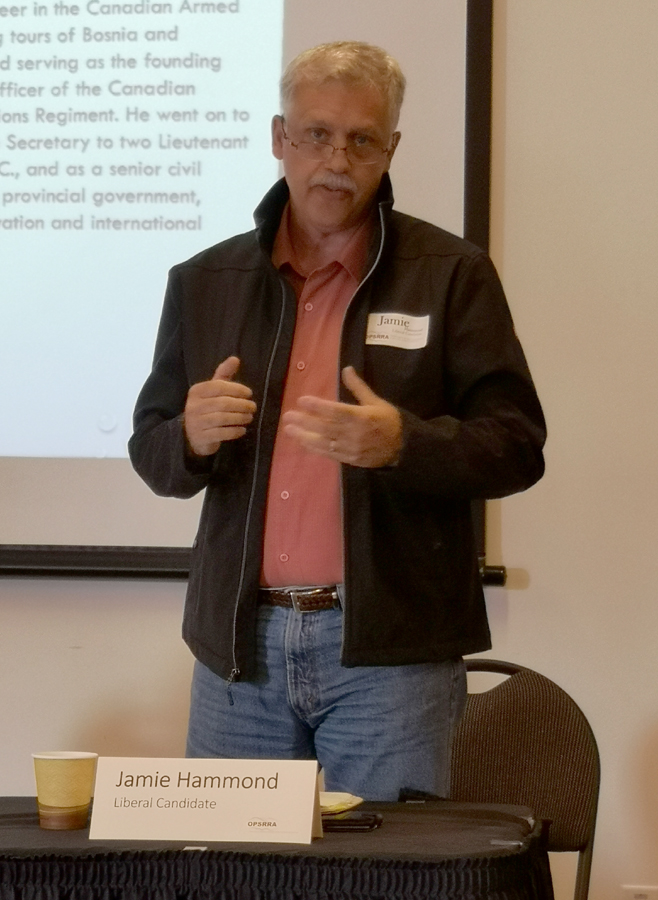
Questions from the public as replied to by all candidates as desired had to do with the salmon issues, proportional representation, and sufficient electric charging station infrastructure.
While the opportunity for closing statements was missed, Pewarchuk used his response to the last public question to remind voters to “be wary of Big Brother” and that it remains important to “protect freedoms and the entrepreneurial spirit” as ways to “protect jobs and put more money into your pocket”, concluding “you know better how to spend your money than the government does”.
Randall Garrison, NDP is the incumbent. He has held the Esquimalt-Saanich-Sooke seat for two terms (2011-2015, 2015-2018). David Merner ran against Garrison in 2015; last time Merner was a Liberal candidate and now represents the Greens. Jamie Hammond and Randall Pewarchuk are new to running for political office.
- These candidates for Esquimalt-Saanich-Sooke will have another opportunity to meet and debate the issues on Friday October 11 at Edward Milne Community School (EMCS) in Sooke, at 6218 Sooke Road (though the Conservative candidate will be unable to attend that one). That event is organized by the Sooke Region Chamber of Commerce, saying the Friday night of Thanksgiving weekend was the only time the auditorium/theatre was available at EMCS. The theatre is large, but a Thanksgiving weekend crowd could be small. See events.
- The Equimalt-Saanich-Sooke candidates will also be debating in the Colwood area on Wednesday October 16 at Brookes Westshore School at 1939 Sooke Road in Colwood. That’s mid-morning 10:45 am to 11:30 am at the school. Parking available on Colwood Crescent beside the school. See events.
The federal election general voting day is Monday October 21. Advance voting is available October 11, 12, 13 and 14 over the Thanksgiving long weekend.
======== LINKS
Pre-event article about this September 29 meeting (format, and how OPSRRA organized it)
Voting information at the Elections Canada website


